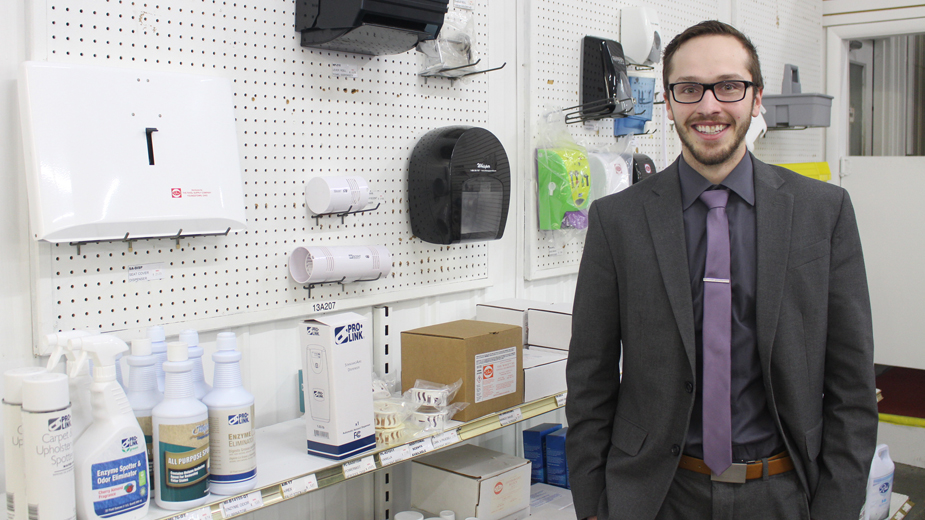‘Going Green’ Movement Changes Workplace Cultures
YOUNGSTOWN, Ohio – Nearly all Americans and their employers are committed to “going green,” most paying at least lip service to reducing humanity’s impact on the environment.
“Manufacturers nationwide, maybe worldwide, have recognized that there’s a movement toward going green,” says Bill Cross, president of Modern Office Products in Boardman. “They’ve jumped on board.”
Since 2000, green products have become increasingly available and affordable in everything from office furniture to cleaning products, suppliers say. Today, an office worker can file paper documents recycled from post-consumer waste as he sits in a chair upholstered with recycled leather. Janitorial teams use biobased products to clean everything from restrooms to office floors, walls and computer screens.
The introduction of so many environmentally friendly office products in so many mundane areas has been gradual, so gradual that it hasn’t registered in the minds of most, Cross says, except the providers of the multitude of products.
“There are manufacturers like Pilot that make a pen from used five-gallon water bottles,” he says. “In most categories, there is something that could fulfill that need.”
Modern Office carries office furniture with a host of green designations, such as “Green Guard,” which is certified for low chemical and particle emissions; “Certified Green,” which is certified for low VOC (volatile organic compounds) emissions; and “CARB Compliant” products that meet air pollutions standards set by the California Air Resources Board.
The Business and Institutional Furniture Manufacturers Association helped in setting the sustainability standards for producers of office furniture. The standards use designations of Level 1 to Level 3 to rate products, based on third-party analyses.
The market for recycled office furniture is projected to grow more than 5% compounded annually by 2020, says a 2016 report by market research company TechNavio.
Owners of office buildings and industrial plants use green products for financial and moral reasons, says Ryan Mirto, director of marketing at Rhiel Supply Co. in Austintown.
“A lot of people don’t want their cleaning staff exposed to these traditionally harsh chemicals,” he says.
By working with harsh chemicals over the course of their employment, janitorial and cleaning staff are more susceptible to ailments such as occupational asthma, also known as industrial asthma, Mirto says.
For owners of buildings looking to cut energy costs and promote sustainability, the use of sustainable cleaning products is crucial, especially when seeking LEED (Leadership in Energy and Environmental Design) certification.
LEED is a rating system the U.S. Green Building Council developed to assess the environmental sustainability of a building, which encompasses design, construction and operation.
Obtaining a LEED certification qualifies owners to claim tax credits and secure zoning variances.
LEED-certified buildings lease space at higher rates, according to the Green Building Council.
“As far as LEED goes, the chemicals that you use to clean, they contribute towards points for the LEED certification,” Mirto says.
Cleaning products and filters are both important for LEED certification, says Rob Reed, president of the Hearn Paper Co. in Youngstown.
Hearn Paper offers vacuum cleaners with HEPA (high efficiency particulate air) filtration. Products are designated bronze, silver or gold based on their level of filtration, Reed says.
Hearn carries a full line of “environmentally responsible janitorial products,” Reed says.
“We have Green Seal certified products and what are called ‘biobased products,’ ” he says.
Green Seal is a nonprofit organization that develops environmental standards for hundreds of products. Tissue paper, hand soap, multipurpose cleaner and industrial cleaner are among the Green Seal certified products available.
In 2002, the U.S. Department of Agriculture defined biobased products as “commercial or industrial products that are composed in the whole, or in significant part, of biological products of renewable domestic agricultural materials or forestry materials.”
Today, biobased cleaners are widely represented among janitorial products, Reed says.
“There are glass cleaners, restroom cleaners, floor cleaners – and you have floor maintenance programs for floor finish and strippers – that are all environmentally responsible,” he says.
Today, companies such as GenEon make cleaners that act as catalysts, Mirto says: “You just add minerals to water and then you electrolyze it, which creates a cleaning solution. It’s really chemical free.”
When Rhiel Supply has to ship only a catalyst, it reduces shipping expense, which also reduces carbon dioxide emissions, Mirto says.
For most business customers, paper products are among the most common green office supplies, suppliers say.
Hearn Paper offers a full line of paper products that are recycled from post-consumer waste and Green Seal certified, Reed says.
Recycled can liners are available, but Green Seal isn’t available yet for such a product.
“For paper, it’s about the products being sourced in a renewable way,” Mirto says. “For chemicals, it’s about using ingredients that are a lot less harmful than what might have been used traditionally.”
But not all companies see an interest in green products, even when they are readily available, Cross says.
“We’ve brought recycled products – from copy paper to writing pads, even ink pens – and promoted them, but it still hasn’t caught on.”
The lack of demand is evident in every product line that Modern Office Products carries, Cross says.
“Let’s say 99.9% of people aren’t asking for it, in any respect, whether it’s a general office supply like copy paper, all the way up to furniture,” he says.
Green products have an undeserved reputation for being more costly, but concerns over quality are declining, Reed says.
“The demand isn’t as high, but the products are effective, so there’s no reason not to lead with them,” he says. In particular, Reed points to the effectiveness of green products made by Spartan Chemical Co. in Maumee, near Toledo.
Safer, greener products have become more prominent and less expensive over the past five years, Mirto says.
“You don’t have to pay a premium to have a green chemical,” he says.
Cross still sees price as a factor in hindering environmentally friendly products from gaining more market share.
“It could only be 5, 10 or 15% cost difference, but it’s just enough to put someone off from spending the extra money to go green,” he says.
Yet demand for green products nationally is on the rise, according to the U.S. Small Business Administration, which recommends that businesses “be green-minded.”
“The area that we live in doesn’t have as high demand as some areas,” Reed admits, but he remains sanguine about the future of sustainable products.
“We’ve been promoting green products for 10 years. It’s something that’s not going away.”
Pictured: Ryan Mirto, director of marketing at Rhiel Supply Co., says he finds that customers use green products for financial and moral reasons.
Copyright 2024 The Business Journal, Youngstown, Ohio.



